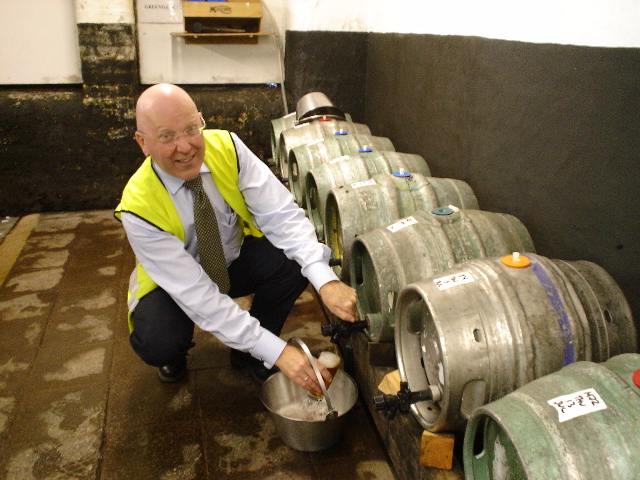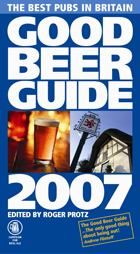
|
|
Real ale (also called
cask ale or cask-conditioned ale) is young beer with some residual
sugar and active yeast cells that is placed in sealed metal
casks. The typical cask has a volume of 10.8 U.S. gallons and is
called a “firkin.” In the sealed firkin the beer undergoes a
special conditioning process whereby the yeast produces a soft
carbonation and complex flavor components and then settles to the
bottom of the cask with the help of finings such as isinglass (made
from fish swim bladders). After a time, excess carbonation is vented
and a serving tap is hammered through a spout on the cask. The beer is
served without pasteurization or additions of artificial carbon dioxide
or other gasses.
Regular kegged beer is usually filtered, pasteurized and “pushed” out
of the keg during serving by adding artificial carbon dioxide to
increase internal keg pressure. Real ale goes from firkin to pint
glass by a simple gravity tap or a handpump beer engine that uses power
from a bartender’s arm muscles to suck the beer from the cask in the
cellar up through tubing to the pub’s bar. Cellars with firkins
are usually kept at 50-55 degrees F. As the beer is dispensed,
cellar air is drawn into the firkin through an open bung at the top of
the cask called a shive. This means that the cask-conditioned
contents of a firkin must usually be consumed over a couple of days to
avoid excessive off-flavors from oxidation. Strong ales like
barleywines can withstand a much longer serving time and usually
experience some very interesting and pleasing flavor and aroma changes
over several days of dispensation. Cask-conditioned ale is truly
a beautiful, “living” beverage that continues to evolve and change over
its entire life from mash to mouth.
These soft, malty, complex beers are served at 50-55 degrees F (cool,
but warm enough to fully experience the flavors) with a low to moderate
level of carbonation that does not numb or prickle the tongue.
Real ales should never be sour, phenolic, excessively cloudy, flat, or
filled with suspended yeast or “floaty bits” – if so, send back the
pint and order a different selection.
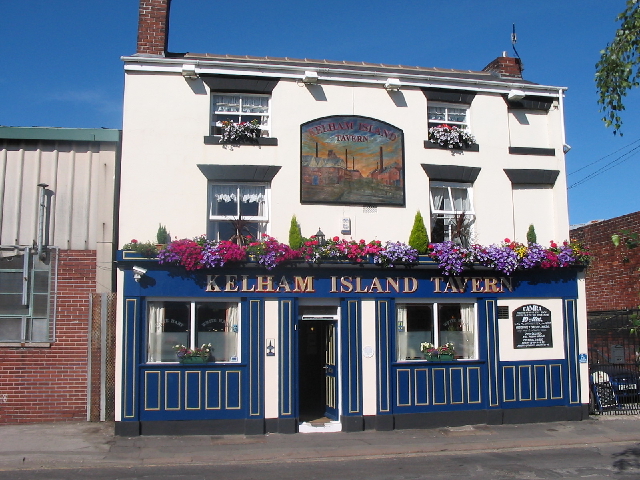
Sheffield's Kelham Island Tavern - Photo by Thel
Melton
The main beer styles typically encountered in good U.K. pubs include
mild, golden ale, bitter, old ale, porter, stout and barleywine.
Milds are lower alcohol, light-bodied brown ales that are gently hopped
and have delicate flavors of malt, nuts, chocolate and fruity
esters. Bitters are medium gold to medium copper in color and
mostly have a moderate hop bitterness backed by pleasant esters and
elegant English malt notes. There are very light-bodied bitters
(designated standard or ordinary) that have an alcohol range of 3.2 to
3.8% alcohol by volume (abv), special or best bitters with 3.8 to 4.6%
abv, and finally extra special or strong bitters with 4.6 to 6.2%
alcohol ranges. Refreshing golden ales have become popular in the
summer and offer a lighter color and less caramel malt flavors than
bitters. Old ales and barleywines are high alcohol beers with a
rich mouthfeel and sweet malt finish. Unfortunately, porters and
stouts (with their dark cocoa and roasted barley character) are
becoming a little difficult to find in England’s pubs in recent years
(especially in the warmer months).
I flew across "the pond" to Manchester in July of 2006 with my friend
Thel Melton for a short, three-day cask ale excursion. Manchester
and the surrounding areas are known in beer circles as top destinations
for pubcrawling and cask ale imbibing. Manchester is a thriving
city that is experiencing huge growth in its economy and landscape in
recent years. The beer and brewery landscape of the city has
changed as well – some classic pubs have closed and more modern ones
have opened. The closing of the iconic Boddingtons Brewery at
Strangeways in 2004 by brewing giant InBev was a depressing blow for
the brewery’s many employees and Manchester ale lovers.
Cask-conditioned Boddingtons is now brewed at the Hydes Brewery on the
other side of the city, and canned Boddingtons is produced at a variety
of other facilities owned by InBev.
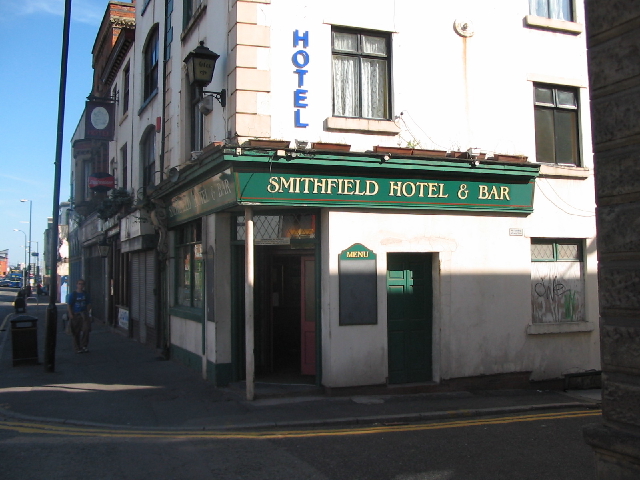
Manchester's Smithfield Hotel & Bar - Photo by Thel Melton
Be sure to buy a day pass for unlimited train rides in Manchester –
this is an easy and economical way to get around town. Our first
stop in Manchester was the historic Greengate Brewery – manufacturers
of J.W. Lees beers. The brewery is a short walk from the Mills
Hill station in the Oldham neighborhood and produces an admirable range
of beers that include a mild, bitter and an exceptional strong ale
called Moonraker (7.5% abv). Giles Dennis (J.W. Lees’ head brewer
for 25 years) showed us around the lovely facility that got its brewing
start back in 1828. The brewery was reconstructed in 1876, and
the architecture from that period is still immensely apparent
today. J.W. Lees has seen its ups and downs over the years, but
there has always been a member of the family to step in and keep the
business on the right track. In the states, look for the
company’s exquisite 11.5% abv Harvest specialty ales that are aged in
various distilled spirit casks.
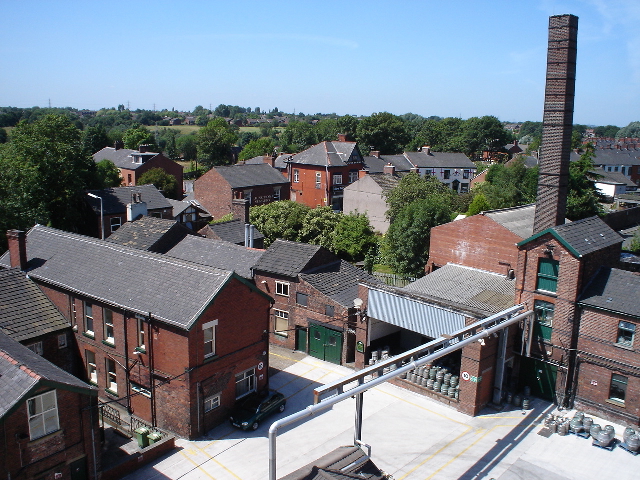
J.W. Lees Brewery
After our morning brewery visit, it was time to head back to central
Manchester to start my city pub crawl (see the pub picks at the end of
this article). Be warned that many of the pubs in England do not
go to the trouble of stocking real ale. The cask-conditioning
process is time consuming and takes training, dedication and talent to
perform properly. Often you will pop into an attractive old pub
only to see standard kegged beers and lagers. Be sure to get a
copy of The Good Beer Guide
that is published each year by a grass roots association of beer
advocates called the Campaign for Real Ale (CAMRA). This
essential guidebook lists only pubs that serve well-cared-for real
ales, and useful information such as addresses, train stops, opening
hours and typical beer selections for each pub are included.
I needed coffee and a full English breakfast the next morning to make
it out of bed and onto a train for a day trip to the former steel
production town of Sheffield. Retail outlets, office buildings
and condos have now replaced steel factories in Sheffield, but this
friendly and attractive town still holds many destinations of interest
to lovers of real ale.
The Kelham Island microbrewery is situated in Sheffield right behind
Fat Cat pub on Alma Street, and owner/brewer Dave Wickett is also a
partner in the new Thornbridge Country House Brewery located just
outside Sheffield in the scenic countryside of Derbyshire. Simon
Webster works in marketing for the brewery and drove us from Sheffield
out to Thornbridge for a quick look around. Thornbridge’s
compact brewhouse is located in an old stonemason’s shop nestled on the
grounds
of a stately mansion called Thornbridge Hall. The home and
grounds surrounding the brewery are absolutely gorgeous, and the ales
produced by Stephano Cossi (Thornbridge's head brewer) are all
outstanding. The award-winning
brewery produces an excellent range of beers that include Lord Marples
bitter (very drinkable with a subtle malt and hop richness), Blackthorn
golden ale (a refreshing ale for summer imbibing), Brock stout
(medium/full bodied and very roasty), and the warming and potent St.
Petersburg Russian imperial stout. Thornbridge’s hoppy Jaipur
India
pale ale was honored with a silver medal in the Strong Bitters category
at the 2006 Great British Beer Festival in London. A great
Derbyshire pub in which to enjoy the Thornbridge beers is The Monsal
Hotel's Stable Bar (near the Peak District National Park) that boasts
eight
excellent, rotating cask ales. The Thornbridge beers are just one
more reason to plan a walking tour and pubcrawl in this aesthetically
pleasing area of Derbyshire.
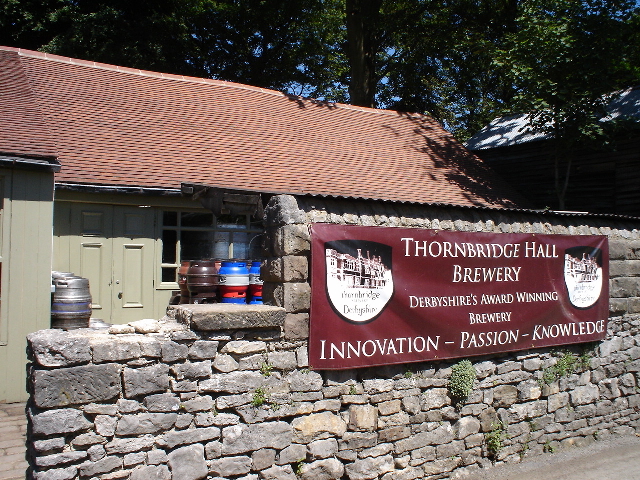
Thornbridge Country House
Brewery located just outside Sheffield
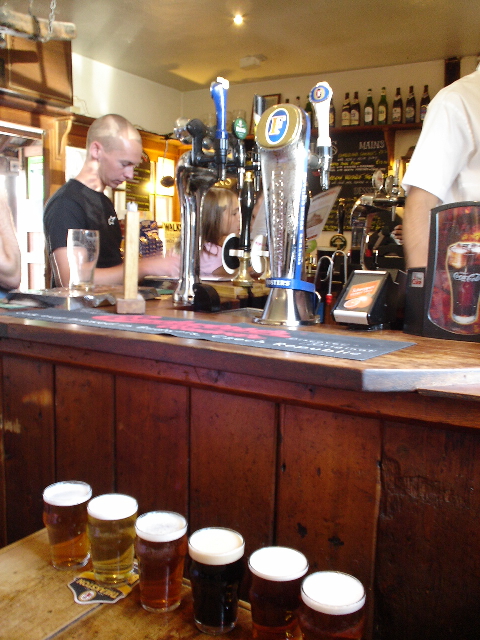
The delightful
Stables Bar at the Monsal Head Hotel
Our Sheffield pub crawl later that afternoon was conducted mostly by
city tram and included attractive, cozy pubs (see pub list) offering
some of the best cask ales from local micros that I have ever
sampled. One of the hazards of English pub crawling is that many
independent pubs stop serving food around 6 p.m. or so – I often get so
caught up in beer sampling that I end up having nuts and crisps (potato
chips) for dinner. There is a big national pub chain called
Wetherspoons that is known for converting old buildings into large,
attractive pubs that serve 2-3 good cask ales and hearty pub meals late
into the evening. Wetherspoons has saved me from starvation on many an
evening.
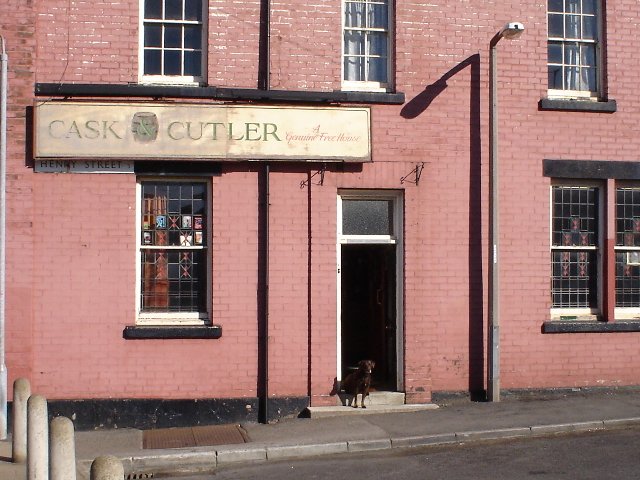
The Cask and Cutler Pub in Sheffield should not be missed.
My favorite pub experience the next day back in Manchester involved
taking the train out a few stops to Stalybridge. As you step off
the train you will see the famous Stalybridge Station Buffet Bar on the
platform. Real ale lovers from all over the region flock to this
pub that offers Victorian charm and four rooms that are filled with pub
and train memorabilia. Sylvia Wood is the long time
cellarmistress who takes great pride in assuring that her ten
cask-conditioned ales are the best available and always kept in peak
condition. The wholesome food goes extremely well with the beer.
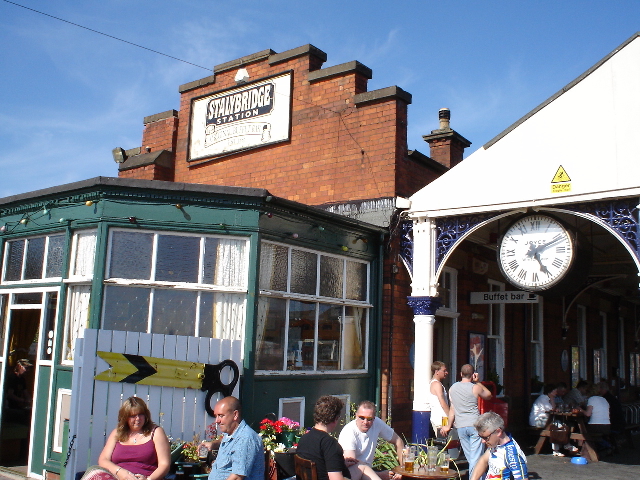
The following day on the plane back to Atlanta I reminisced about how
much I enjoyed the pubs and their real ales. The flavors of the beers
and the character of the pubs seem to combine for warm, rich, rewarding
experiences for me. But for a time in the 70’s through the 90’s
it appeared that real ale and real pubs were an endangered
species. Younger drinkers became infatuated with bland lagers and
looked upon classic, three-dimensional ales like milds as “an old man’s
drink.” It was not pretty.
After many years of decline, sales of real ales are now on a steady
increase in the United Kingdom due mostly to the efforts of
CAMRA. English beer drinkers (even many younger ones) are now
realizing that cask ale holds a great deal of appeal in terms of
history, flavor and sophistication. CAMRA organizes the annual
Great British Beer Festival in London that was proud to welcome its
millionth festival attendee in 2006. The organization’s
membership is at a record high and its new “Wild about Mild” campaign
has drawn much-deserved attention to mild ales and has been successful
in a significant increase in mild production this year in the
U.K. The future does look very promising for English cask ale,
and I urge you to visit England soon to do your part in supporting the
fine ales and pubs that are so much a part of that country’s national
heritage.
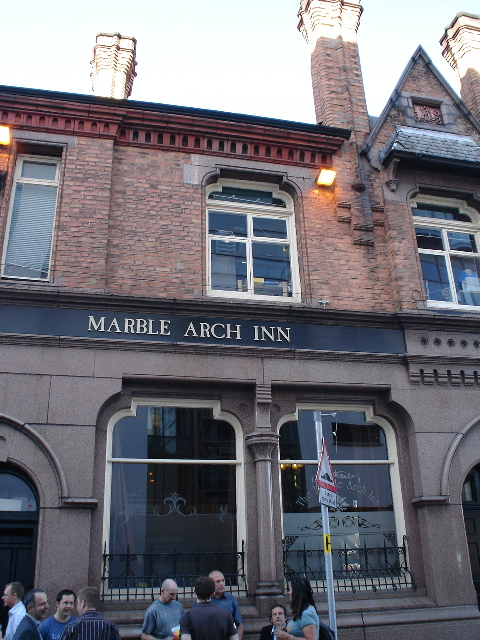
OWEN'S MANCHESTER PUB FAVORITES:
- Bar Fringe, 8 Swan Street
– A cross between a Belgian beer bar and an English pub. Cask ale
and many fine Belgian bottled beers are available in the bar or the
beer garden out back.
- Britons Protection, 50
Great Bridgewater Street – City center pub with antique tilework, a
long front bar and two additional rooms in back. 4-5 nice real
ales from regional breweries.
- Crescent, 18-21 Crescent –
Independent pub with ten noteworthy cask ales. The pub is owned
and operated by the friendly husband and wife team of Sal and Idy.
- Knott, 374 Deansgate – The
interior looks more like a funky college bar than an English pub, but
there are excellent real ales here along with beers from Belgium and
Germany.
- Marble Arch, 73 Rochdale
Road – Wonderful brewpub producing a fine range of house real
ales. The tiny brewery is in the back behind a non-smoking dining
room.
- Peveril of the Peak, 127
Great Bridgewater Street – This gorgeous old masterpiece has green
tiled outer walls and dates back to 1834. “The Pev” has managed
to hang on despite years of development with trendy restaurants and
apartments springing up all around.
- Rain Bar, 80 Great
Bridgewater Street – Beautiful J.W. Lees pub across the street from
Peveril of the Peak. Named Rain Bar because it was built on the site of
an old umbrella factory. Try the J.W. Lees bitter, mild or
Moonraker strong ale.
- Smithfield Hotel &
Bar, 37 Swan Street – Located in the lobby floor of a small
B&B. The eight real ales are hand-picked by a devoted and
knowledgeable staff. The last beer festival held in the bar and
cellar offered 52 casks!
- Stalybridge Station Buffet
Bar, Platform 1, Stalybridge Station – See description above – a
must-see pub!
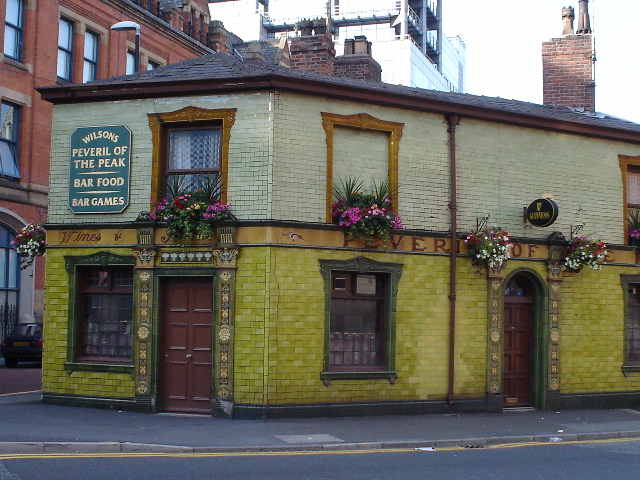
Manchester's Acclaimed Peveril of the Peak
OWEN'S SHEFFIELD PUB FAVORITES:
- Banker’s Draft, 1 Market
Place – Wetherspoon pub in a large, two-story converted bank
building. Good real ales and pub meals served all day.
- Cask & Cutler, 1 Henry
Street – The highlight of any great real ale pub crawl in north
Sheffield. This pub (refurbished in the 1940’s) seems to be the
meeting place of every hard-core, real ale geek in the city. The
nine taps offer a superb range of ales from local microbreweries.
- Devonshire Cat, 49
Wellington Street – Trendy, modern looking bar in the bottom corner of
a large building. Some of the wide array of real ales and ciders
are served by gravity tap in a glass-enclosed, temperature-controlled
display room behind the bar.
- Fat Cat, 23 Alma Street –
This delightful pub serves as the brewery tap for the Kelham Island
microbrewery and offers regular and vegetarian cuisine, guest ales, and
a variety of different dining rooms and an outdoor patio.
- Frog & Parrot,
Division Street – Comfortable pub with a row of windows convenient for
people watching. Six real ales.
- Hillsborough Hotel, 54-58
Langsett Road (a dozen or so short blocks northwest of Cask &
Cutler) – A small brewhouse is located on the
premises producing ales under the name Crown & Wellington. A
wide range of guest beers are also offered.
- Kelham Island Tavern, 62
Russell Street – Trevor Wraith has owned this pub for almost five years
and functions as cook and cellarmaster. There are eleven
exceptional cask ales here with a mild and stout always on
handpump. In the summer check out the beer garden that is filled
with lush vegetation and flowers. This pub is not associated with
the nearby Kelham Island Brewery.
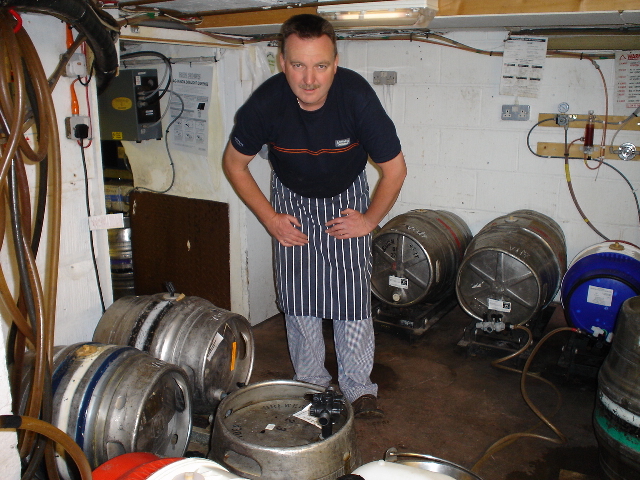
Trevor Wraith in the cask
cellar of the Kelham Island Tavern |
